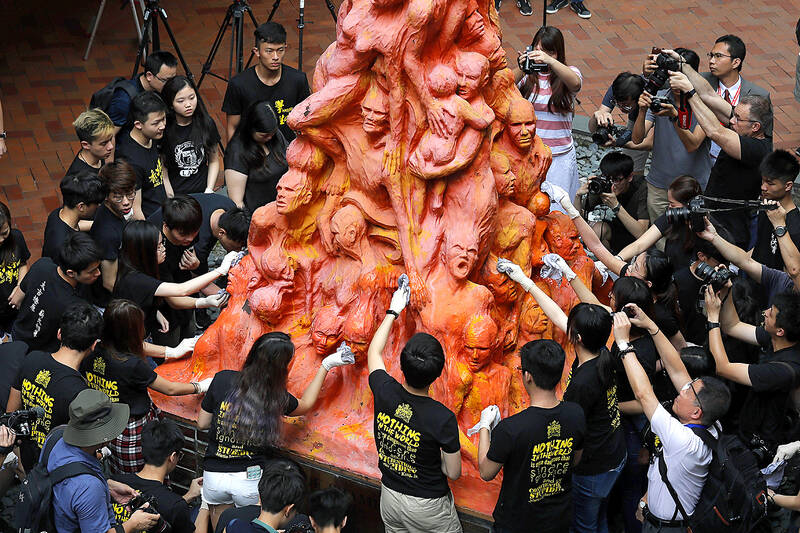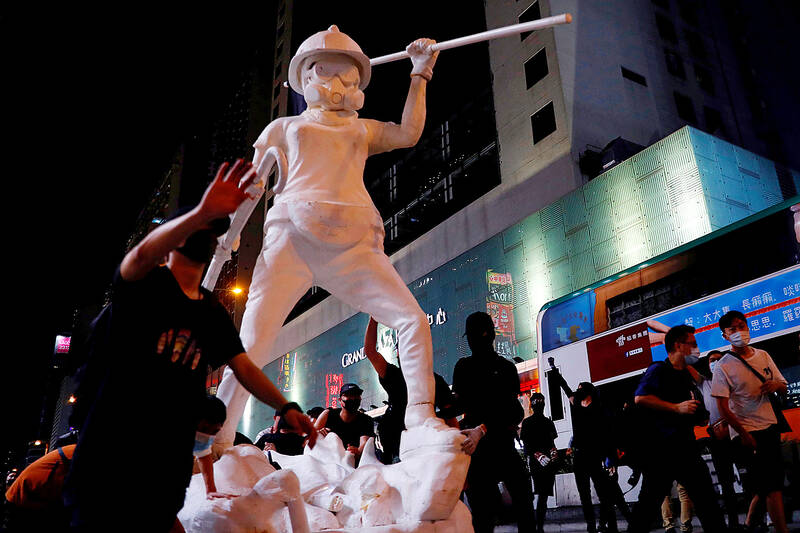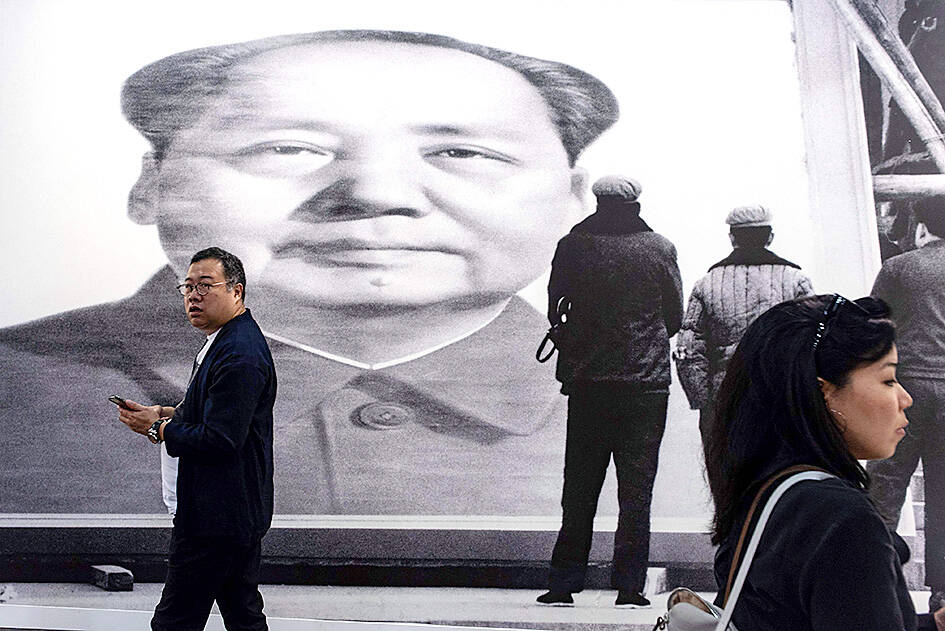From a rocky perch a larger-than-life rendition of a female protester, clad in a hard hat and a gas mask, gazes over a city in turmoil. Known as Lady Liberty Hong Kong, the statue was hauled to the top of Lion Rock during the 2019 pro-democracy protests. It was meant to be her final resting place. But now all that remains of that intention is photographs. The statue was destroyed by unknown assailants the day after it was hauled up the peak, a landmark said to represent the resilient spirit of Hongkongers.
A photograph of Lady Liberty’s brief installation is one of several images relating to Hong Kong to be displayed in The Forbidden Art, an exhibition that opens on Monday in Brussels. Staged outside the EU parliament building, it aims to present a “fervent defense of artistic freedom as a fundamental human right.”
Many of the artists featured no longer feel safe working in Hong Kong.

Photo: AP
“The government wants to silence all of us,” says Lumli, one half of Lumli Lumlong, an artist duo she formed with her husband, Lumlong. The couple left Hong Kong in 2021, fearing for their safety.
“We’re worried that Hong Kong culture will disappear,” Lumlong adds, “but on the other hand it could reappear all over the world.”
The exhibition, organized by Hong Kong-born artist Loretta Lau and Jens Galschiot, a Danish sculptor who made the Pillar of Shame statue that was removed from Hong Kong University in 2021, comes as Hong Kong is trying to cling to its status as a global arts hub, while also grappling with an exodus of artists and increasing calls on international art institutions to boycott the Beijing-controlled territory.

Photo: Reuters
‘I FEEL SORRY FOR THE ARTISTS WHO STAY’
In September, a former president of the Hong Kong chapter of the International Association of Art Critics, Eric Wear, published an open letter calling on galleries to boycott Art Basel’s 2024 Hong Kong art fair, which opens on 28 March.
“Censorship should be rare, with debated safeguards, and never used to support oppressive governments or erase collective memory,” Wear wrote. “Unfortunately, this is not the present situation in Hong Kong.”

Photo: AFP
Overt and implicit limits on artistic expression are becoming increasingly clear. In 2020, after months of pro-democracy protests, Beijing introduced a national security law, which criminalized in broad terms secession, subversion, terrorism and collusion with foreign forces. Chinese authorities say it was necessary to restore stability; critics say the vague wording crushes dissent. More recently, authorities have been talking with increasing frequency about the need to tackle “soft resistance,” a vague term that appears to refer to the use of “media, culture and art” to defy the authorities.
All this has led to opaque or convoluted decisions from artistic venues. In January, the Hong Kong Institute of Contemporary Culture canceled a lease agreement with performing arts group Fire Makes Us Human because of complaints from the education bureau, which cited national security concerns. The following month, M+, a museum of visual culture, removed the name of the film Beijing Bastards, a well-known feature about China’s disillusioned youth, from the credits and brochures of a screening. Explaining the decision, a spokesperson for M+ said: “Regarding the movie mentioned, the film title was updated by film-maker Zhang Yuan (張元) and M+ curatorial team.”
“I feel sorry for artists who stay in Hong Kong,” says Kacey Wong (黃國才), an artist who left for Taiwan in 2021. “Their minds must be spinning so fast. They censor themselves.”
Wong predicts that more artists will leave after a new, homegrown national security law, known as Article 23, is implemented this year. The draft text proposes sentences of up to life in prison for some crimes, including insurrection and treason. A Chinese government spokesperson said Article 23 was necessary for “lasting stability and security in Hong Kong” and that the legislation was “legitimate, lawful and beyond reproach.”
A BOOMING MARKET
With many of Hong Kong’s most outspoken artists either in exile or silenced, commercial institutions are at the heart of a debate about the future of the city’s creative industries.
The government says Hong Kong still has a “vibrant arts and culture community,” touting its share of the global art market as evidence. According to the Art Basel and UBS art market report, China and Hong Kong’s share of the market last year rose to 19 percent, making it the second-largest after the US.
“Hong Kong still has some tremendous advantages over other markets in the region,” says Wear. “The biggest advantage probably is on tax and just generally an environment which makes the movement of goods very smooth.”
The result, according to Wear, is that art institutions “both accept restrictions in Hong Kong and probably increasingly [are] party to exporting those restrictions to other markets.”
A spokesperson for Art Basel said the fair had “never faced any censorship issues at our shows, nor have we been asked to do anything differently since the introduction of the national security law.
“The Hong Kong art scene has grown exponentially since our arrival in 2013 … and our show has become a focal point for the city’s arts community.”
Art Basel Hong Kong 2024 received HK$15m (US$1.9 million) in funding from the government’s mega arts and cultural events fund, which is administered by the culture, sports and tourism bureau. Government funding agreements now routinely include a clause about national security.
An Art Basel spokesperson said: “Our company always abides by the laws and regulations of the jurisdictions in which we operate.”
The comments echo those made by Henry Tang (唐英年), the head of the West Kowloon Cultural District, a cultural hub, when its flagship M+ gallery opened in 2021: “The opening of M+ does not mean that artistic expression is above the law. It is not.”
Today, the museum advertises its collection of Ai Weiwei’s (艾未未) Study of Perspective series, in which the artist holds his middle finger up to various landmarks. But while several photographs in the series are advertised online, the listing for the Tiananmen Square edition, in which Beijing’s central plaza is flipped off by the dissident artist, displays only a gray square with the M+ logo. A museum spokesperson said: “M+ handles its curatorial matters in a professional and independent manner. All of its contents are in full compliance with the laws and regulations of Hong Kong while maintaining the highest level of professional and artistic integrity.”
Defenders of Hong Kong’s art scene point to the fact that even in mainland China’s more restrictive environment, art sells. Political freedom may not be necessary to keep the city’s arts industry afloat, even if in a neutered form. But “people need to be able to reflect on their environment,” says Wear. “Once you begin to hem that in, you lose something. You lose some of the dynamism of the society, you lose the ability to be self-critical as a society … all of this undermines the capacity of a society to evolve.”

April 28 to May 4 During the Japanese colonial era, a city’s “first” high school typically served Japanese students, while Taiwanese attended the “second” high school. Only in Taichung was this reversed. That’s because when Taichung First High School opened its doors on May 1, 1915 to serve Taiwanese students who were previously barred from secondary education, it was the only high school in town. Former principal Hideo Azukisawa threatened to quit when the government in 1922 attempted to transfer the “first” designation to a new local high school for Japanese students, leading to this unusual situation. Prior to the Taichung First

When the South Vietnamese capital of Saigon fell to the North Vietnamese forces 50 years ago this week, it prompted a mass exodus of some 2 million people — hundreds of thousands fleeing perilously on small boats across open water to escape the communist regime. Many ultimately settled in Southern California’s Orange County in an area now known as “Little Saigon,” not far from Marine Corps Base Camp Pendleton, where the first refugees were airlifted upon reaching the US. The diaspora now also has significant populations in Virginia, Texas and Washington state, as well as in countries including France and Australia.

On April 17, Chinese Nationalist Party (KMT) Chairman Eric Chu (朱立倫) launched a bold campaign to revive and revitalize the KMT base by calling for an impromptu rally at the Taipei prosecutor’s offices to protest recent arrests of KMT recall campaigners over allegations of forgery and fraud involving signatures of dead voters. The protest had no time to apply for permits and was illegal, but that played into the sense of opposition grievance at alleged weaponization of the judiciary by the Democratic Progressive Party (DPP) to “annihilate” the opposition parties. Blamed for faltering recall campaigns and faced with a KMT chair

Article 2 of the Additional Articles of the Constitution of the Republic of China (中華民國憲法增修條文) stipulates that upon a vote of no confidence in the premier, the president can dissolve the legislature within 10 days. If the legislature is dissolved, a new legislative election must be held within 60 days, and the legislators’ terms will then be reckoned from that election. Two weeks ago Taipei Mayor Chiang Wan-an (蔣萬安) of the Chinese Nationalist Party (KMT) proposed that the legislature hold a vote of no confidence in the premier and dare the president to dissolve the legislature. The legislature is currently controlled